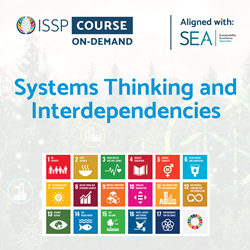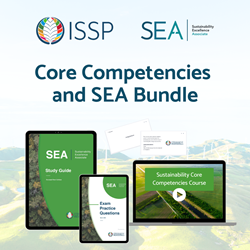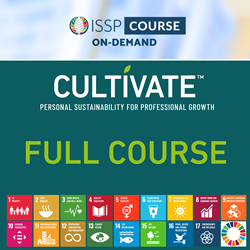Systems Thinking and Interdependencies Course
On-Demand Courses
This module explains systems thinking, explores its structure, and provides examples of interdependencies in nature that require this problem-solving approach.
You’ll learn to pursue strategies that address the root causes of problems – not just their symptoms. Sustainability professionals must often address complex problems involving many interdependent variables, and this requires a problem-solving approach that relies on understanding the full system.
The content of this video is based on Chapter 4 of the SEA Study Guide and can be used as preparation for the SEA exam. This course is a tool to help you study for the exam, but completion of the Sustainability Core Competencies course does not guarantee passing the SEA exam. [Read disclaimer.]
Access to this course will be available for 1 year from date of purchase.
This course module is presented in five sections, approximately one hour:
- 4.1 Introduction - Understand the definition of systems thinking, why this strategy is vital for sustainability practitioners, and what often thwarts this problem-solving approach.
- 4.2 Systems Structure and Behavior - Discover the elements of systems thinking, including (1) stocks, flows, and dynamic equilibrium and complexity, (2) feedback loops, (3) shifting dominance, delays, and oscillations, (4) scenarios and testing models, (5) constraints, (6) resilience, self-organization, and hierarchy, and (7) mindsets and models.
- 4.3 Applying Systems Thinking - Understand how to switch from a linear mindset to a systems thinking approach by exploring mindsets and mental models.
- 4.4 Examples of Interdependencies - Explore topics that illustrate the interdependent nature of the world around us, demonstrating why systems thinking is a core sustainability concept.
- 4.5 Conclusion - Review why systems thinking makes us better decision makers and allows us to see synergy in solutions.
Course participants will take one quiz at the end of this module, approximately 10 questions.
Following the successful completion of the course, students will receive a Certificate of Completion, indicating knowledge of core sustainability concepts and best practices.
The completion of the full Sustainability Core Competencies course earns 5 Continuing Education Units (CEU) for SEA and SEP credential holders, and the completion of this module alone earns 0.5 CEU credits.
ISSP is not able to offer refunds once you have purchased access to your course, resource, or membership for any reason, including change of personal financial standing, health, or inability to access to our site. If you are dissatisfied with your purchase or are otherwise unable to access your purchased product/service in its entirety, you may read our FAQs or reach out to technical support.
When purchasing a product/service from ISSP, you agree and understand that changing your mind about the product/service, failing to follow through or understand the details of the purchase, not experiencing the results expected or desired, or experiencing any other similar situations does not entitle you to a refund.
Important ⚠️ You must login or create a free account before purchasing courses/study materials. Your course access is tied to your account.




